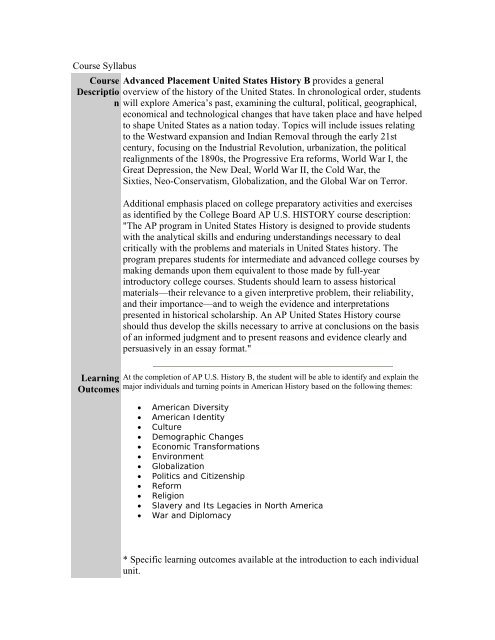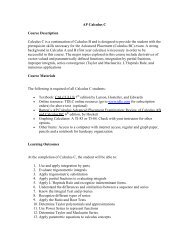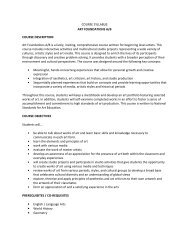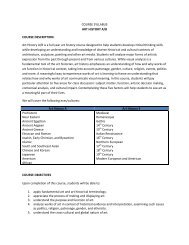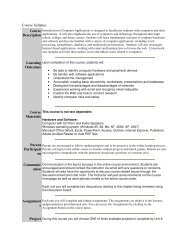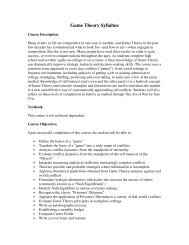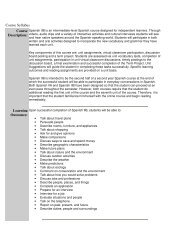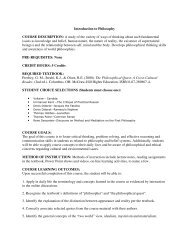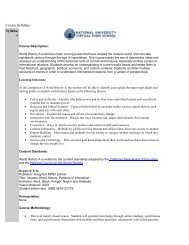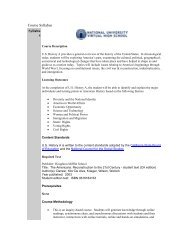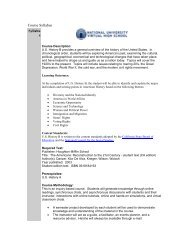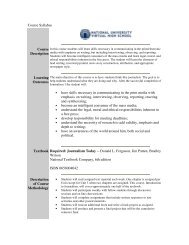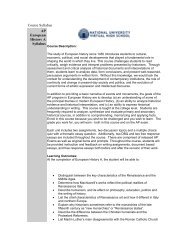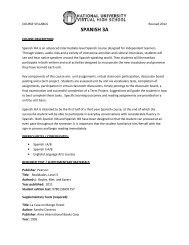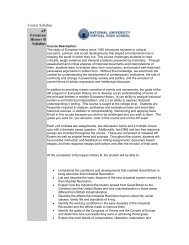AP US History B Syllabus - National University Virtual High School
AP US History B Syllabus - National University Virtual High School
AP US History B Syllabus - National University Virtual High School
Create successful ePaper yourself
Turn your PDF publications into a flip-book with our unique Google optimized e-Paper software.
Course <strong>Syllabus</strong><br />
Course Advanced Placement United States <strong>History</strong> B provides a general<br />
Descriptio overview of the history of the United States. In chronological order, students<br />
n will explore America’s past, examining the cultural, political, geographical,<br />
economical and technological changes that have taken place and have helped<br />
to shape United States as a nation today. Topics will include issues relating<br />
to the Westward expansion and Indian Removal through the early 21st<br />
century, focusing on the Industrial Revolution, urbanization, the political<br />
realignments of the 1890s, the Progressive Era reforms, World War I, the<br />
Great Depression, the New Deal, World War II, the Cold War, the<br />
Sixties, Neo-Conservatism, Globalization, and the Global War on Terror.<br />
Additional emphasis placed on college preparatory activities and exercises<br />
as identified by the College Board <strong>AP</strong> U.S. HISTORY course description:<br />
"The <strong>AP</strong> program in United States <strong>History</strong> is designed to provide students<br />
with the analytical skills and enduring understandings necessary to deal<br />
critically with the problems and materials in United States history. The<br />
program prepares students for intermediate and advanced college courses by<br />
making demands upon them equivalent to those made by full-year<br />
introductory college courses. Students should learn to assess historical<br />
materials—their relevance to a given interpretive problem, their reliability,<br />
and their importance—and to weigh the evidence and interpretations<br />
presented in historical scholarship. An <strong>AP</strong> United States <strong>History</strong> course<br />
should thus develop the skills necessary to arrive at conclusions on the basis<br />
of an informed judgment and to present reasons and evidence clearly and<br />
persuasively in an essay format."<br />
Learning At the completion of <strong>AP</strong> U.S. <strong>History</strong> B, the student will be able to identify and explain the<br />
Outcomes major individuals and turning points in American <strong>History</strong> based on the following themes:<br />
• American Diversity<br />
• American Identity<br />
• Culture<br />
• Demographic Changes<br />
• Economic Transformations<br />
• Environment<br />
• Globalization<br />
• Politics and Citizenship<br />
• Reform<br />
• Religion<br />
• Slavery and Its Legacies in North America<br />
• War and Diplomacy<br />
* Specific learning outcomes available at the introduction to each individual<br />
unit.
Content U.S. <strong>History</strong> B is written to the content standards adopted by the California State<br />
Standards Board of Education, <strong>National</strong> Council for the Social Studies, and College Board.<br />
Required<br />
Text<br />
Publisher: Pearson Longman<br />
Title: America Past and Present<br />
Author(s): Robert Divine, T.H. Breen, George Fredrickson, R. Hal Williams, Ariela Gross,<br />
H.W. Brands<br />
Year Published: 2007<br />
Course<br />
Methodolo<br />
gy<br />
• This is an inquiry-based course. Students will generate knowledge through online<br />
readings, synchronous chats, and asynchronous discussions with students and their<br />
instructor, interactions with online tutorials, online and hands-on simulations,<br />
weekly in-class discussion, and virtual classroom chats.<br />
• A semester project developed by each student will be used to demonstrate<br />
knowledge and understanding of the material in the course.<br />
• The instructor will act as a guide, a facilitator, an events planner, and a resource<br />
advisor. He/she will always be available through e-mail.<br />
• The student must actively construct and acquire knowledge by being intrinsically<br />
motivated to succeed. To succeed, students must participate and complete all<br />
readings and activities. This course requires the student’s active participation.<br />
• Both formal and informal assessment methods will be used in the course. Informal<br />
assessment will include an evaluation of the quality and timeliness of participation<br />
in class activities. Formal assessment may include multiple-choice quizzes, tests,<br />
discussion board participation, and written assignments. A final exam will be<br />
given at the end of the course.<br />
Units of<br />
Study<br />
Unit Assignments / Activities<br />
1 Text - selections from:<br />
o<br />
o<br />
Chapter 17 – The West: Exploiting an Empire<br />
Chapter 18 - Industrial Society<br />
Discussion Topics:<br />
o<br />
o<br />
Learning Styles Assessment<br />
Indian Policy<br />
Activities:<br />
o<br />
o<br />
Lean Bear's Changing West - Questions<br />
Blacks in Blue - Questions
o<br />
o<br />
A Machine Culture - Questions<br />
Chicago's "Second Nature" - Questions<br />
Quiz<br />
2 Text - selections from:<br />
o<br />
o<br />
1890's<br />
Chapter 19 - Toward and Urban Society<br />
Chapter 20 - Political Realignments in the<br />
Discussion Topics:<br />
o<br />
o<br />
o<br />
o<br />
o<br />
o<br />
The Overcrowded City<br />
Ellis Island: Isle of Hope, Isle of Tears<br />
Plessy v. Ferguson<br />
Hardship and Heartache<br />
The Wonderful Wizard of Oz<br />
The McKinley Administration<br />
Activities:<br />
o<br />
Short Answer Compositions and Test<br />
Preparation<br />
Quiz<br />
3 Text - selections from:<br />
o<br />
o<br />
Chapter 21 - Toward Empire<br />
Chapter 22 - The Progressie Era<br />
Discussion Topics:<br />
o<br />
o<br />
o<br />
o<br />
o<br />
o<br />
Roosevelt and the Rough Riders<br />
Acquisition of Empire<br />
The 400 Million Customers of China<br />
Muckrakers Call for Reform<br />
Margaret Sanger and the Birth Control<br />
Movement<br />
The New Urban Culture<br />
Activities:<br />
o<br />
Essay Composition<br />
Quiz
4 Text - selections from:<br />
o<br />
o<br />
Chapter 23 - From Roosevelt to Wilson<br />
Chapter 24 - The Nation at War<br />
Discussion Topics:<br />
o<br />
o<br />
o<br />
o<br />
o<br />
o<br />
o<br />
The Rupublicans Split<br />
Roosevelt Progressivism at Its Height<br />
Madam C.J. Walker<br />
Muller v. Oregon<br />
The Sinking of the Lusitania<br />
Measuring the Mind<br />
Woodrow Wilson's Fourteen Points<br />
Activities:<br />
o<br />
o<br />
Design Power Point<br />
Discussion - Philanthropy in American Life<br />
Midterm - Covers Units 1-4<br />
5 Text - selections from:<br />
o<br />
o<br />
Chapter 25 - Transition to Modern America<br />
Chapter 26 - FDR and the New Deal<br />
Discussion Topics:<br />
o<br />
o<br />
o<br />
o<br />
o<br />
Wheels for the Millions<br />
Marcus Garvey: Racial Redemption and Black<br />
<strong>National</strong>ism<br />
The Scopes "Monkey" Trial: Contesting<br />
Cultural Differences<br />
The Struggle Against Despair<br />
Eleanor Roosevelt and the Quest for Social<br />
Justice<br />
Activities:<br />
o<br />
o<br />
Webcasting: Video or Audio Presentation<br />
Duscussion - Challenging Social Security<br />
Quiz
6 Text - selections from:<br />
o<br />
o<br />
Chapter 27 - America and the World<br />
Chapter 28 - The Onset of the Cold War<br />
Discussion Topics:<br />
o<br />
o<br />
o<br />
o<br />
o<br />
o<br />
A Pact Without Power<br />
Turning the Tide Against the Axis<br />
The Face of the Holocaust<br />
The Potsdam Summit<br />
Containment<br />
The "Lost Sheep" of the Korean War<br />
Activities:<br />
o<br />
o<br />
Isolationism<br />
War Strategy: Korea and Iraq<br />
Quiz<br />
7 Text - selections from:<br />
o<br />
o<br />
Chapter 29 - Affluence and Anxiety<br />
Chapter 30 - The Turbulent Sixties<br />
Activities:<br />
o<br />
o<br />
o<br />
o<br />
Levittown: The Flight to the Suburbs<br />
The Reaction to Sputnik<br />
Kennedy versus Nixon<br />
Unintended Consequences<br />
Discussion:<br />
o<br />
o<br />
The Cold War<br />
Years of Turmoil<br />
Quiz<br />
8 Text - selections from:<br />
o<br />
o<br />
Chapter 31 - To a New Conservatism<br />
Chapter 32 - To the Twenty-first Century
Topics:<br />
o<br />
o<br />
o<br />
o<br />
o<br />
o<br />
Reagan and America's Shift to the Right<br />
The Economy of Stagflation<br />
The Christian Right<br />
Roe v. Wade<br />
Foreign Policy in the Post Cold-War Era<br />
The Dot.com Boom, Bust, and Echos<br />
Activities:<br />
o<br />
Final Exam Preparation<br />
Final Exam - Covers Units 1-8<br />
Assessmen<br />
t and<br />
Grading<br />
Scale<br />
Type of Assessment<br />
Assignments<br />
Discussion Forums<br />
Quizzes<br />
Points<br />
5 points each<br />
5 points each<br />
20 points each<br />
Exploration Project Steps 1-3: 5 points each<br />
Final Project: 100 points<br />
Midterm Exam (Unit 4) 100 points<br />
Final Exam (Unit 8) 100 points<br />
Grading Scale<br />
Letter Grade Percentage Earned<br />
A 90% - 100%<br />
B 80% - 89%<br />
C 70% - 79%<br />
D 60% - 69%<br />
F 59% and lower<br />
Student's<br />
Roles and<br />
Resposibili<br />
ties<br />
Student’s Role and Responsibilities in this Course<br />
Expectations<br />
Students are expected to conduct themselves in a responsible manner that<br />
reflects sound ethics, honor, and good citizenship. It is the student’s<br />
responsibility to maintain academic honesty and integrity and to manifest<br />
their commitment to the goals of NUVHS through their conduct and<br />
behavior. Students are expected to abide by all NUVHS policies and<br />
regulations. Any form of academic dishonesty, or inappropriate conduct by<br />
students or applicants may result in penalties ranging from warning to
dismissal, as deemed appropriate by NUVHS.<br />
Communication<br />
Throughout this course, students will need to be in close contact with their<br />
instructor and fellow students. Students are expected to communicate via<br />
email and electronic discussion boards. Therefore, students should plan on<br />
checking email at least three times a week and participate in the discussion<br />
boards during the weeks they are live.<br />
Instructors strongly encourage and welcome open communication. Clear,<br />
consistent, and proactive communication will ensure a successful experience<br />
in this course. It is the student’s responsibility to notify the instructor<br />
immediately if and when a personal situation occurs that affects his/her<br />
performance in this class. Being proactive with communication will result in<br />
a quick solution to any problems that may occur.<br />
Technical Support is offered through Spectrum Pacific Learning Company<br />
(SPLC). Should a student need any technical assistance, he/she should<br />
email the Help Desk as soon as possible at helpdesk@myonlinelogin.com or<br />
call 1-877-533-4733. SPLC will help resolve technical problems and walk<br />
through the solution with students. If a problem persists for more than 48<br />
hours, the student must also notify their teacher and NUVHS.<br />
Time Required For This Course<br />
To complete this course in eight weeks, students should plan to allocate at<br />
least 12-15 hours a week on assigned readings, assignments, discussions<br />
(asynchronous and synchronous), quizzes, and exams. It is highly<br />
recommended that students organize themselves around the course schedule.<br />
NUAHS wishes every student great success in their online class. Please<br />
contact us at 1.866.366.8847 if any questions arise.<br />
NUAHS Expected <strong>School</strong>wide Learning Results (ESLRs):<br />
It is anticipated that NUVHS students will be:<br />
Engaged Learners<br />
1. Demonstrate self-directed learning skills such as time management, and<br />
personal responsibility through the completion of course requirements<br />
2. Develop an understanding of their own preferred learning styles to<br />
enhance their overall academic potential<br />
3. Incorporate effective and relevant internet and multimedia resources<br />
in their learning process to broaden their knowledge base<br />
Critical Thinkers
1. Effectively analyze and articulate sound opinions on a variety of<br />
complex concepts<br />
2. Illustrate a variety of problem-solving strategies that strengthen<br />
college preparation and workforce readiness<br />
3. Formulate a framework for applying a variety of technology and<br />
internet-based research to enhance information literacy and collaborative<br />
thinking<br />
Effective Communicators<br />
1. Demonstrate awareness and sensitivity to tone and voice in multiple<br />
forms of communication<br />
2. Express concepts and ideas in a variety of forms<br />
3. Enhance communiccation skills through the use of media rich or<br />
other technology resources<br />
Global Citizens<br />
1. Appreciate the value of diversity<br />
2. Understand the range of local and international issues facing today's<br />
global community<br />
3. Demonstrate awareness of the importance of cultural sensitivity and<br />
social responsibility in the 21st century


